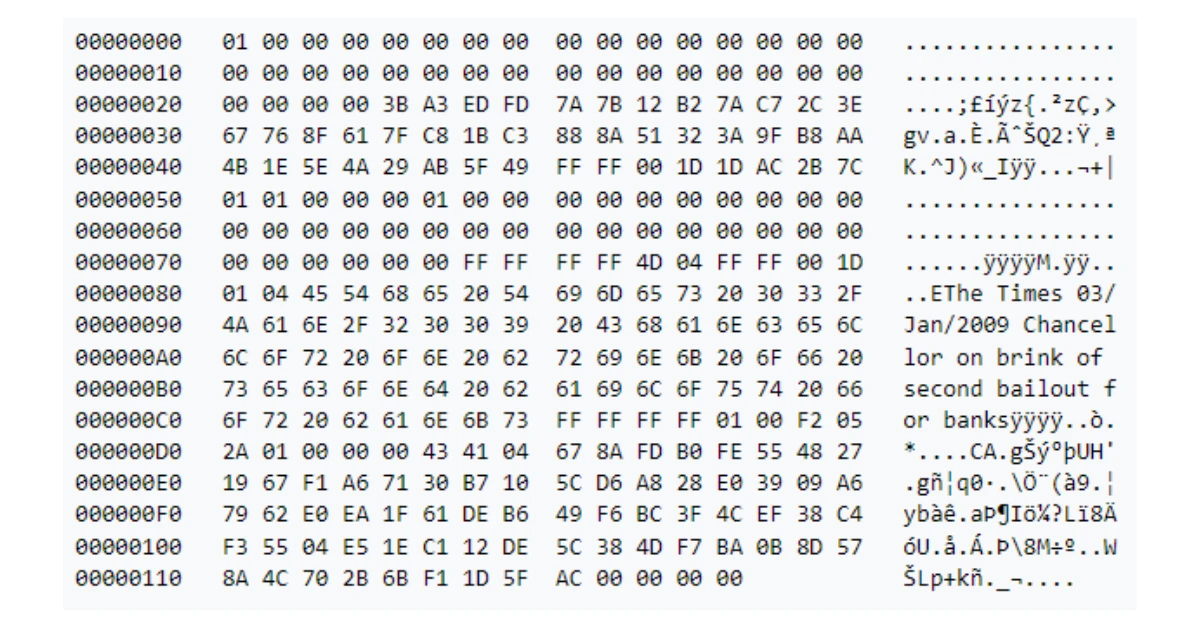What Is a Genesis Block?
The genesis block refers to the very first block in a blockchain, and it’s typically hardcoded into the blockchain’s software. A blockchain consists of multiple “blocks” (which contain verified transactions and recorded activity data) that are linked together in a metaphorical chain.
Each “block” in a cryptocurrency’s blockchain contains reference data to the previous block and derives its value/legitimacy from its predecessor. Thus, the genesis block refers to the initial block (Block 0 or Block 1) of a new blockchain, to which all subsequent blocks are attached.
The Genesis block is unique because it’s the only block in the blockchain that doesn’t reference a previous block. Additionally, in most cases, the first mining reward it unlocks is unusable.
Key Takeaways
|
Genesis Block of Bitcoin
The Genesis Block of Bitcoin is the first Bitcoin block ever mined, created on January 3, 2009. It contains a total of 50 Bitcoins, which are believed to belong to Satoshi Nakamoto – the still-unidentified creator of Bitcoin. This block is distinct from all others because it primarily holds the configuration and rules needed for the blockchain to function smoothly. The height of this block is ‘0’ because there is nothing before or “above” it in the chain.
As the first block, the Genesis Block forms the foundation of the entire Bitcoin transaction system and serves as the prototype for all subsequent blocks in the blockchain.
This block also includes the now-famous message: “The Times 03/Jan/2009 Chancellor on brink of second bailout for banks.”

Genesis Block of Other Cryptocurrencies
Ethereum (ETH)
Genesis Block Date: July 30, 2015
Ethereum’s genesis block marked the launch of a platform that extended the capabilities of blockchain beyond just digital currency. Created by Vitalik Buterin and his team, Ethereum introduced smart contracts—self-executing contracts with the terms directly written into code. This innovation paved the way for decentralized applications (dApps) and the booming DeFi (Decentralized Finance) sector.
Litecoin (LTC)
Genesis Block Date: October 7, 2011
Litecoin, created by Charlie Lee, is often called the silver to Bitcoin’s gold. Its genesis block was mined to offer a lighter, faster version of Bitcoin. Litecoin’s transactions are quicker and its block generation time is 2.5 minutes, compared to Bitcoin’s 10 minutes, making it more suitable for smaller transactions.
Ripple (XRP)
Genesis Block Date: N/A (Pre-mined)
Ripple operates differently from Bitcoin and Ethereum. Instead of mining, all 100 billion XRP tokens were created initially and a portion was released gradually. Ripple’s focus is on facilitating fast, low-cost international payments. It’s more of a real-time gross settlement system than a traditional cryptocurrency.
Cardano (ADA)
Genesis Block Date: September 29, 2017
Cardano, developed by Input Output Hong Kong (IOHK) under the leadership of Charles Hoskinson, aims to be a more secure and scalable blockchain platform. Its genesis block launched the Byron phase, which allowed users to trade and transfer ADA, Cardano’s native cryptocurrency. Cardano uses a unique proof-of-stake consensus mechanism called Ouroboros, which is designed to be more energy efficient than traditional proof-of-work systems.
Polkadot (DOT)
Genesis Block Date: May 26, 2020
Polkadot, created by Dr. Gavin Wood, one of Ethereum’s co-founders, aims to enable different blockchains to interoperate. Its genesis block launched a new era of interoperability and scalability, allowing various blockchains to share information and functionality seamlessly through the Polkadot network’s unique relay chain and parachains.
The Bottom Line
The term “Genesis Block” in blockchain refers to the very first block created in a blockchain network. While it originally described the first Bitcoin block, it is now widely used across various blockchain systems. Despite the proliferation of different blockchain platforms, the term “Genesis Block” remains a fundamental concept in the field.








